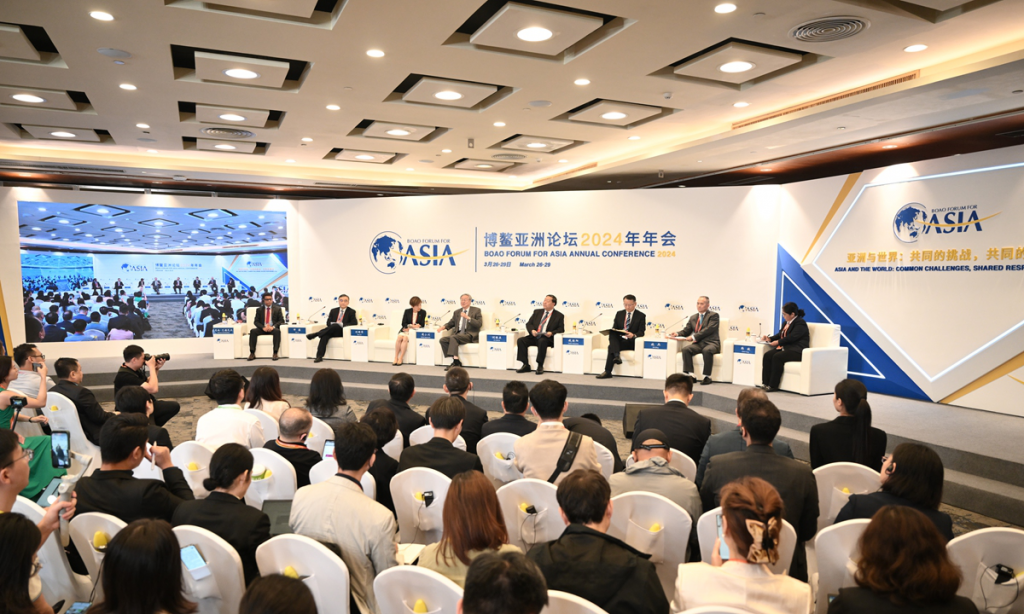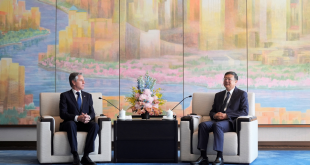Published: March 27,2024

Participants take notes at a sub-forum of the Boao Forum for Asia 2024 annual conference titled “Accelerating Transition toward Zero-Carbon Power” in Qionghai, South China’s Hainan Province on March 26, 2024. Photo: VCG
The Boao Forum for Asia (BFA) convened its annual conference in Boao, South China’s Hainan Province on Tuesday, with officials and other participants calling for unity and cooperation in Asia and around the world to jointly tackle rising regional and global challenges, ranging from trade protectionism to geopolitical tension.
In a flagship report released on Tuesday, the BFA, which is often referred to Asia’s version of the World Economic Forum in Switzerland, projected a substantial upswing in economic growth of around 4.5 percent in 2024 and that Asia’s economic integration remains unchanged, while warning of challenges. The report pointed out China’s major contribution to global economic growth with its vast market, highlighting China’s critical role in not just Asia, but also the world.
This year’s BFA drew representatives from more countries and regions than last year’s edition, underscoring the rising influence of not just the BFA itself, but also the host nation – China. Many foreign guests in Boao highlighted China’s solid economic fundamentals and improving business environment, echoing a resounding message from global business executives at the China Development Forum (CDF) in Beijing that concluded just a day before the BFA opened.
The BFA and the CDF are two back-to-back forums held by China after the two sessions, the annual meetings of the top legislature and top political advisory body, where it set social and economic development goals for the year. The high-level forums are a critical window for global CEOs to gauge China’s economic outlook and policy priorities. They are also a reliable barometer for China’s attractiveness among countries and regions and multinational corporations.
This year’s BFA annual conference will be attended by nearly 2,000 representatives from more than 60 countries and regions, Li Baodong, secretary general of the BFA, said at a press conference on Tuesday morning, which officially kicked off the four-day event. While the number of participants is about the same as that of last year’s meeting, the number of countries and regions represented increased to more than 60 from last year’s number of about 50.
At the press conference, the BFA released two flagship annual reports: one on the Asian Economic Outlook and Integration Progress and the other on sustainable development in Asia, setting the stage for dozens of panel discussions on topics ranging from economic development to technological innovation.
“In 2024, global economic turbulence and divergence will persist. Faced with a severe external environment, many Asian economies will also encounter significant internal challenges. Nevertheless, the region’s economic growth and regional integration continue to show promising momentum,” the Asian Economic Outlook report said, projecting a “substantial” growth of 4.5 percent in 2024.
The report also noted that the overall trend of merchandise trade integration advancing among Asian economies remains unchanged, while also calling for collaboration on common challenges of various uncertainties, in line with the theme of this year’s annual conference: “Asia and the World: Common Challenges, Shared Responsibilities.”
“The problems the world currently faces are numerous and complex. Only when the international community jointly meets the challenges, shoulders responsibilities and strengthens cooperation can the world remain on the track of peace and prosperity,” Li said at the press conference.
This photo taken on March 22, 2024 shows a view of a low-carbon area on Dongyu Island in Boao, south China’s Hainan Province. (Xinhua/Zhang Liyun)
Cooperation vs protectionism
At the panel discussions and in the conference halls that host the BFA on Tuesday, there was general consensus on the need to safeguard multilateralism and bolster win-win cooperation championed by China, and a clear rejection of protectionism spearheaded by some US and EU politicians.
Many forum participants highlighted China’s strong economic prospects and its critical role in helping boost economic development in Asia and around the world.
“I think China is playing a very important role in trying to develop the rest of Asia. And that’s in the interest of China because if Asia grows, China grows,” Shamshad Akhtar, former under-secretary-general of the United Nations, told the Global Times on Tuesday in Boao, adding that globally, China is also playing a “phenomenal role” in lifting different countries by offering capital through initiatives such as the Belt and Road Initiative.
This is also reflected in the BFA’s report released on Tuesday morning, which noted that China will remain a major contributor to global economic growth, with the entire world benefiting from its massive market.
Beyond its vast market, China’s commitment to expand opening-up and improve business environment to attract foreign investment was also highlighted at the BFA.
“I think it’s getting more attractive to invest in China, as China is making changes, such as working on their intellectual property protection. Chinese laws have improved a lot,” Carl F. Fey, professor of Strategy at BI Norwegian Business School in Oslo, Norway, told the Global Times on Tuesday on the sidelines of the BFA annual meeting, noting that China still has to work to let people around the world know that its laws have improved given misperceptions around the world.
Through platforms such as the BFA and the CDF, China is sending a clear message that it welcomes global investors and will improve the business environment. Pointing to such an effort, high-level Chinese officials met with various global business leaders after the CDF, reaffirming China’s commitment to high-quality development and high-level opening-up.
Meanwhile, the US’ approach of protectionism is also rejected at the BFA. That was very clear at a panel discussion on confronting fragmentation in global trade on Tuesday afternoon, where panelists, though not mentioning the US by name, criticized various actions by the US. Long Yongtu, China’s former chief negotiator for entry into the World Trade Organization (WTO), blasted the West for crippling the WTO that they created.
Wong Kan Seng, former deputy prime minister of Singapore, highlighted the need for maintaining economic openness, saying closed markets benefit no country, according to a Chinese transcript of the panel provided by the BFA. Meanwhile, former US commerce secretary Carlos Gutierrez was more straightforward, saying that the US should bear the blame for the de-globalization situation, according to the same transcript.
Since the administration of former US president Donald Trump, the US has actively undermined the WTO, issued a series of protectionist policies, including imposing tariffs and handing out discriminatory subsidies, and is seeking to decouple the Chinese and US economies through moves such as restrictions on businesses. Meanwhile, the EU appears to be following in the US’ wake by calling for “de-risking,” which is seen as another name for “decoupling.”
“Decoupling would be damaging for both, but worse for Europe than for China. That’s why we, European politicians, are rethinking whether this is a good idea to do it,” Michele Geraci, former undersecretary of state at the Italian Ministry of Economic Development, told reporters from the Global Times and other media outlets in Boao on Tuesday, noting China’s decreasing reliance on exports and Europe’s increasing reliance on exports.
Global Times
 Africa -China Review Africa -China Cooperation and Transformation
Africa -China Review Africa -China Cooperation and Transformation
